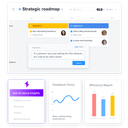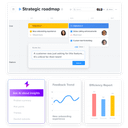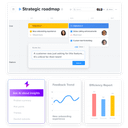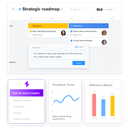Airfocus vs Productboard (2025 Comparison)

Airfocus offers intuitive prioritization frameworks and seamless integrations, making it a versatile choice for teams looking to streamline their product management process.
- Intuitive prioritization frameworks.
- Easy integration with other tools.
- User-friendly interface.
- Limited customer feedback tools.
- Basic market insights.
Free plan?
YesStarting price
$59 per month per user
Productboard provides comprehensive customer feedback and advanced roadmapping features, making it an ideal choice for teams focused on building customer-centric products.
- Comprehensive customer feedback.
- Advanced roadmapping features.
- Extensive market insights.
- Slightly higher learning curve.
- More expensive than some alternatives.
Free plan?
YesStarting price
$19 per monthWhat is Airfocus?
Airfocus is a strategic product management platform that helps teams prioritize their projects and align their work with business goals. It offers a range of features like prioritization frameworks, roadmaps, and integrations with popular tools, making it easier for teams to focus on what truly matters. By using Airfocus, you can streamline your decision-making process, ensuring that your team is always working on the most impactful tasks. This tool is particularly beneficial for product managers who need to balance multiple priorities and communicate effectively with stakeholders.
What is Productboard?
Productboard is a product management software that empowers teams to understand customer needs, prioritize features, and align their product strategy with business objectives. It offers a comprehensive suite of tools for collecting customer feedback, creating roadmaps, and collaborating with cross-functional teams. Productboard helps product managers make informed decisions by providing a clear view of customer insights and market trends. This tool is ideal for teams looking to build customer-centric products and ensure that their development efforts are aligned with user needs.
Pros and Cons of Airfocus vs Productboard

Pros & Cons of Airfocus
- Airfocus offers intuitive prioritization frameworks that make it easy to rank tasks based on strategic importance. This feature is particularly useful for teams juggling multiple projects and needing to focus on what truly matters.
- Airfocus integrates seamlessly with popular tools like Jira, Trello, and Slack, allowing you to connect with your existing workflow effortlessly. This makes it a versatile choice for teams using multiple platforms.
- Airfocus boasts a user-friendly interface that simplifies navigation and reduces the learning curve for new users. This makes it an ideal choice for teams looking to get started quickly without extensive training.
- While Airfocus offers some customer feedback tools, they are not as comprehensive as those provided by competitors like Productboard. This may be a limitation for teams that rely heavily on customer insights.
- Airfocus provides basic market insights, which may not be sufficient for teams looking to stay ahead of industry trends. For more detailed market analysis, other tools may be more suitable.

Pros & Cons of Productboard
- Productboard excels in gathering and analyzing customer feedback, providing valuable insights that can drive product development. This feature is essential for teams looking to build customer-centric products.
- Productboard offers advanced roadmapping capabilities, allowing for greater customization and detail. This makes it a superior choice for teams needing detailed roadmaps to guide their product strategy.
- Productboard provides extensive market insights, helping teams stay informed about industry trends and make data-driven decisions. This feature is invaluable for teams looking to maintain a competitive edge.
- Productboard's advanced features come with a slightly higher learning curve, which may require additional training for new users. This could be a consideration for teams looking for a more straightforward solution.
- Productboard's comprehensive feature set comes at a higher price point compared to some alternatives. This may be a factor for teams with budget constraints looking for a more cost-effective solution.
Airfocus vs Productboard: At A Glance
Value to Price
Airfocus offers a competitive pricing model that aligns well with its feature set, making it a cost-effective choice for teams looking to prioritize effectively. Productboard, on the other hand, provides a slightly higher value due to its extensive customer insights and feedback tools, which can be crucial for customer-centric product development. If you are looking for a tool that offers more value for the price, Productboard might be the better choice.
Ease of Use
Airfocus is designed with simplicity in mind, making it easy for teams to get started quickly. Its intuitive interface allows users to navigate through features without much hassle. Productboard also scores high on ease of use, with a user-friendly design that facilitates collaboration and communication. However, Productboard's interface is slightly more polished, making it a better option for those who prioritize ease of use.
Functionality
Airfocus provides robust functionality with its prioritization frameworks and roadmap features, which are essential for strategic planning. Productboard, however, takes functionality a step further by offering comprehensive customer feedback tools and market insights, which are invaluable for product managers. If functionality is your top priority, Productboard is the superior choice.
Scalability
Airfocus is well-suited for small to medium-sized teams, offering scalability options that grow with your business. Productboard, however, is designed to handle larger teams and more complex projects, making it a better fit for organizations looking to scale rapidly. If scalability is a key concern, Productboard is the more suitable option.
Integrations
Airfocus offers a wide range of integrations with popular tools like Jira, Trello, and Slack, making it easy to connect with your existing workflow. Productboard also provides extensive integration options, but with a slightly broader range, including advanced API capabilities. If integrations are crucial for your workflow, Productboard offers a more comprehensive solution.
Customer Support
Airfocus provides reliable customer support with a dedicated team ready to assist users. Productboard also offers excellent customer support, with additional resources like webinars and community forums. While both tools provide strong support, Productboard's additional resources give it a slight edge in this dimension.
Security
Airfocus ensures data security with robust encryption and compliance with industry standards. Productboard also prioritizes security, offering advanced security features and regular audits. Both tools provide strong security measures, but Productboard's additional security features make it a slightly more secure option.
Overall Rating
Both Airfocus and Productboard are excellent tools for product management, each with its strengths. Airfocus excels in prioritization and simplicity, while Productboard offers superior customer insights and functionality. Depending on your specific needs, either tool could be the right choice, but Productboard's overall feature set gives it a slight advantage.
Airfocus vs Productboard: A Detailed Breakdown of Key Features
Prioritization Frameworks
Airfocus shines with its prioritization frameworks, allowing you to easily rank tasks based on strategic importance. I found this feature particularly useful when juggling multiple projects. Productboard also offers prioritization tools, but they are not as intuitive as Airfocus. If prioritization is your main focus, Airfocus is the better choice.
Roadmapping
Both Airfocus and Productboard offer robust roadmapping features. Airfocus provides a straightforward approach, making it easy to visualize your product strategy. Productboard, however, offers more advanced roadmapping capabilities, allowing for greater customization and detail. If you need detailed roadmaps, Productboard is the superior option.
Customer Feedback
Productboard excels in gathering and analyzing customer feedback, providing valuable insights that can drive product development. Airfocus also offers feedback tools, but they are not as comprehensive. If understanding customer needs is crucial for your team, Productboard is the better choice.
Collaboration Tools
Both tools offer excellent collaboration features, but Productboard's tools are slightly more advanced, facilitating better communication across teams. Airfocus provides solid collaboration options, but if seamless teamwork is a priority, Productboard is the way to go.
Market Insights
Productboard provides extensive market insights, helping you stay ahead of industry trends. Airfocus offers some market analysis tools, but they are not as detailed. If staying informed about market trends is important, Productboard is the better option.
API Capabilities
Productboard offers advanced API capabilities, allowing for greater integration with other tools. Airfocus also provides API options, but they are not as extensive. If API capabilities are a priority, Productboard is the superior choice.
Pricing Comparison of Airfocus and Productboard
To assist you in making an informed choice, we’ve outlined the pricing plans and essential features of Airfocus and Productboard. This comparison will highlight the best option for managing your product strategy.

Airfocus Pricing Plans
- Prioritize tasks effectively using Priority Ratings and Charts.
- Visualize data with Board, Timeline, Table, Chart, List & Inbox views.
- Engage with users on a branded Portal for better interaction.
- Integrate seamlessly with dev tools like Jira, Trello, and more.
- Create product portfolios with Item Mirror for better organization.
- Align team members with Priority Poker for collaborative decision-making.
- Plan and visualize releases with Gantt views for effective planning.
- Unlock possibilities with API access for enhanced customization.
- Measure activity with Reporting for data-driven insights.
- Integrate with enterprise tools like Jira Server and Salesforce.
- Manage users with SAML SSO for enhanced security.
- Plan and allocate Capacity across workspaces and teams.

Productboard Pricing Plans
- 1 Teamspace for collaborative work management.
- 1 Objective to align team goals effectively.
- 1 Product Portal for centralized product information.
- Integration with Jira and Azure DevOps for seamless workflow.
- 2 Insights automations to streamline feedback processing.
- Portal moderation for managing customer interactions.
- Feedback loop closing to ensure customer satisfaction.
- Release planning for efficient product launches.
- 3 Teamspaces for enhanced team collaboration.
- 10 Objectives to drive strategic alignment.
- 10 Insights automations for advanced feedback analysis.
- Customizable feature statuses and data fields for flexibility.
- Unlimited Objectives for comprehensive goal setting.
- Strategic planning tools for high-level decision making.
- 3+ Product Portals for extensive product management.
- SAML SSO & Google SSO for secure access.
Our Rating Methodology
We thoroughly evaluate each product management tool, focusing on key aspects like functionality, ease of use, and customer support. By analyzing user reviews and conducting hands-on testing, we ensure our recommendations are reliable. Each factor is weighted to provide an accurate final rating, helping you choose the best tool for your needs.
Airfocus or Productboard: Which One Matches Your Business Needs?
Choose Airfocus If You Need ...
- Intuitive prioritization frameworks
If you are a team looking for a tool with intuitive prioritization frameworks that make it easy to rank tasks based on strategic importance, Airfocus is the ideal choice. Its user-friendly interface and seamless integrations make it a versatile option for teams juggling multiple projects.
- Easy integration with other tools
If you need a tool that integrates seamlessly with popular platforms like Jira, Trello, and Slack, Airfocus is the right choice. Its easy integration capabilities allow you to connect with your existing workflow effortlessly, making it a versatile option for teams using multiple tools.
Choose Productboard If You Need ...
- Comprehensive customer feedback
If you are a team focused on building customer-centric products, Productboard is the better choice. Its comprehensive customer feedback tools provide valuable insights that can drive product development, making it an essential tool for understanding customer needs.
- Advanced roadmapping features
If you require detailed roadmaps to guide your product strategy, Productboard is the superior option. Its advanced roadmapping capabilities allow for greater customization and detail, making it a better fit for teams needing comprehensive planning tools.
Frequently Asked Questions
 What are the main differences between Airfocus and Productboard?
What are the main differences between Airfocus and Productboard?
 Which tool is better for customer-centric product development?
Which tool is better for customer-centric product development?
 How do Airfocus and Productboard compare in terms of integrations?
How do Airfocus and Productboard compare in terms of integrations?
 Which tool offers better value for the price?
Which tool offers better value for the price?
 Is Airfocus suitable for large teams?
Is Airfocus suitable for large teams?
 How do the security features of Airfocus and Productboard compare?
How do the security features of Airfocus and Productboard compare?

Anastasia Belyh
Anastasia Belyh is a senior tech writer with over 15 years of experience in marketing, sales, and business software. Having worked in investment banking, management consulting, and founded multiple companies, her in-depth knowledge and hands-on expertise make her software reviews authoritative, trustworthy, and highly practical for business decision-makers.



